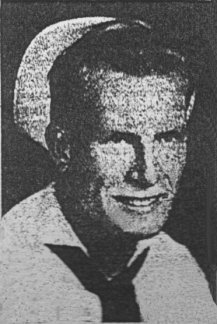Scotte Hecht, USN.Scottie J. Hecht, son of Henry C. Hecht of this city, returned home the latter part of last month, having received his discharge from the Navy October 19 at St. Louis. He enlisted July 15, 1942, in the V-5 program of the Navy and remained in preliminary flight training at the University of Georgia, at Athens, until January 19, 1943. Previous to entering school at Georgia U. he took civilian pilot training at Kansas University.
From Athens he went to Charleston, S. C., as a seaman and went on to Norfolk, Va. He was in the first draft of sailors to be assigned to a destroyer escort. Scotte left the Boston Navy Yard July 16, 1943, for the Pacific and was in the first strike of the Navy at Bougainvillea. He remained on duty in the Pacific until January, 1944, when he had a seven day emergency leave to see his father who was in failing health.
Returning to the Pacific, he was in on securing Eniwetok from the Japs, and he met "Mutt" Emerson one day on Guam. Scotte took part in the invasions of Guam, Saipan, then the Palau Islands.
In the liberation of the Philippines he was a member of the killer group which screened the operations before the amphibious units went in 16 to 20 days later. A number of D. E's were used as "bait" to lure the Jap Navy from their home island bases and Scotte and his group were missed by Jap carriers by only two hours on two occasions. It was pretty exciting moving through the channels of the many islands of the Philippines playing hide and seek with the Jap ships, Scotte says.
While he has seen lots of suicide planes dive into our fleet, none hit his ship but fell into the water close by. The kamikaze planes tried first to knock out the flattops (carriers), then the tin cans (destroyers). His cousin Roy Hecht, was right in the middle of things on the U. S. S. Flint, a CL97 cruiser, but he was no casualty. Scotte became a Coxswain on his D. E. and was in the Navy 39 months.
The typhoons were the most terrifying experiences he had. Sometimes the ship would roll in excess of 60 degrees and with a wind of 120 to 150 miles per hour a ship tosses the sailors around like a fly in a half filled bottle turned end for end rapidly.
He plans to continue his schooling under the G. I. Bill of Rights which was sponsored by the American Legion.
Thanks to Shirley Brier for finding, transcribing and contributing the above news article to this web site!
This website is being created by HTML Guy Jerry Ferrin with the able assistance of many Contributors. Your comments, suggestions and contributions of historical information and photographs to this site are welcome. Please sign the Guest Book. This page was last updated 2 June 2005.
